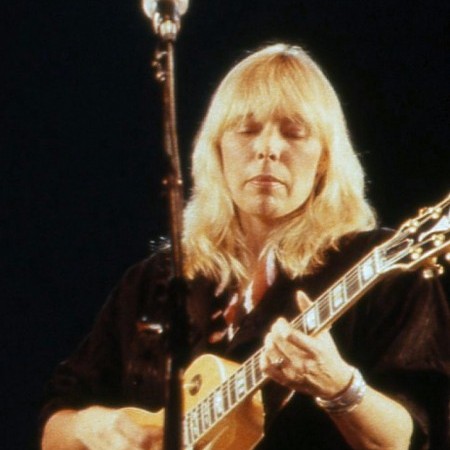
Joni Mitchell performs in 1983.
(Photo: Creative Commons Attribution 2.0 Generic)Anyway, by my doing this card, he introduced me to some jazz. Then I heard, at a party, Lambert, Hendricks & Ross, The Hottest New Sound In Jazz, which at that time was out of issue up in that part of the country, in Canada. So, I literally saved up and bought it at a bootleg price, and in a way, I’ve always considered that album to be my Beatles, because I learned every song off it. “Cloudburst” I couldn’t sing, because of some of the very fast scatting on it; but I still to this day know every song on that album. I don’t think there’s another album that I know every song on, including my own.
I loved that album, the spirit of it. And like I say, it came at a time when rock ’n’ roll was winding down, just before the Beatles came along and revitalized it. And during that ebb, that’s when folk music came into its full power.
What were the Miles Davis albums?
Sketches Of Spain. I must admit that it was much later that Miles really grabbed my attention ... and Nefertiti and In A Silent Way became my all-time favorite records in just any field of music. They were my private music; that was what I loved to put on and listen to—for many years now. Somehow or other, I kept that quite separate from my own music. I never thought of making that kind of music. I only thought of it as something sacred and unattainable. So, this year was very exciting to play with the players that I did.
You did let your hair down one time when you did “Twisted.”
Right—and “Centerpiece,” I also did that. One by one, I’ve been unearthing the songs from that Lambert, Hendricks & Ross album.
But there’s no seeming relationship between the two worlds ...
Which two worlds are you referring to?
The world of music you recorded and the jazzworld.
All the time that I’ve been a musician, I’ve always been a bit of an oddball. When I was considered a folk musician, people would always tell me that I was playing the wrong chords, traditionally speaking. When I fell into a circle of rock ’n’ roll musicians and began to look for a band, they told me I’d better get jazz musicians to play with me, because my rhythmic sense and my harmonic sense were more expansive. The voicings were broader; the songs were deceptively simple. And when a drummer wouldn’t notice where the feel changed or where the accent on the beat would change, and they would just march through it in the rock ’n’ roll tradition, I would be very disappointed and say, “Didn’t you notice there was a pressure point here” or “Here we change,” and they just would tell me, “Joni, you better start playing with jazz musicians.”
Then, when I began to play with studio jazz musicians, whose hearts were in jazz but who could play anything, they began to tell me that I wasn’t playing the root of the chord. So, all the way along, no matter who I played with, I seemed to be a bit of an oddball. I feel more natural in the company that I’m keeping now, because we talk more metaphorically about music. There’s less talk and more play.
You’ve been associating with jazz studio musicians for how long?
Four years. I made Court And Spark five albums ago.
Did that come about by design or by accident?
The songs were written and I was still looking for a band intact, rather than having to piece a band together myself. Prior to that album, I had done a few things with Tom Scott, mostly doubling of existing guitar lines. I wanted it to be a repetition or gilding of existing notes within my structure. So, through him, I was introduced to that band. I went down to hear them at the Baked Potato in Studio City and that’s how all that came about.
They all found it extremely difficult at first, hearing the music just played and sung by one person; it sounded very frail and delicate, and there were some very eggshelly early sessions where they were afraid they would squash it, whereas I had all the confidence in the world that if they played strongly, I would play more strongly.
So, from that point on, you worked with the L.A. Express?
We worked together for a couple of years, in the studio and on the road.